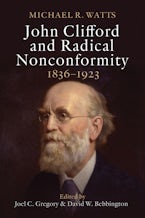In 1966, Michael R. Watts completed his Oxford dissertation on the life of John Clifford (1836-1923). Although Watts intended for the work to be published, he passed away unexpectedly and the dissertation remained uncirculated. While conducting research in Oxford, Joel C. Gregory discovered Watts' bound carbon-paper copy. Baylor's Truett Theological Seminary and Baylor University Press have partnered to bring this long-hidden manuscript, John Clifford and Radical Nonconformity, to light.
A contemporary of distinguished Baptist ministers such as Charles Spurgeon and Alexander Maclaren, John Clifford forged his way as a pastor, national leader, evangelist, and social activist. Clifford's greatest influence on Baptist life flourished in the midst of controversy. His adoption of Christian socialism and his involvement in the Downgrade controversy became landmarks during his career. Clifford's socialism was marked by a deep care for the impoverished lower classes in England, and his role in helping to preserve the Baptist Union following Spurgeon's resignation created an impactful and lasting legacy that is recounted here in Watts' dissertation.
While three biographies of Clifford were published during his lifetime and one shortly after his death, the publication of Watts' dissertation provides new insights into Clifford's life and theology and includes contemporaneous material on Clifford from periodicals such as the Freeman, the General Baptist Magazine, and the Westbourne Park Record. Watts advances an account of Clifford's public life from 1858 to 1923, analyzes key works from 1870 to 1883, and surveys the history of Watts' church from 1886 until his death. The resulting work is a comprehensive and fresh recounting of the life of one of the most influential Baptist preachers in the denomination's history.

